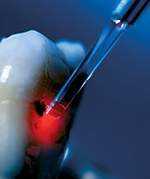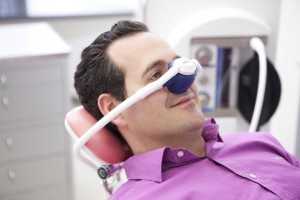
Teeth grinding and its consequences
Why frequent headaches, earache and back problems can come from the teeth
Does this sound familiar to you: you wake up in the morning and feel like you’re in a car? You have a headache, your neck is tense and your temples hurt.
To get your jaw started, you first have to massage your cheeks, and if you open your mouth wide, it will crack in your jaw joints.
Maybe your ears hurt and your teeth are sensitive to cold. These symptoms indicate that you are gritting or clenching your teeth at night! In technical language that is called bruxism. Where does that come from and what consequences can it have? What can you do about it?
Here you find the answers:
TMJ info to download
The first episodes of teeth grinding
Teeth are worn and sensitive, gums go back
If someone presses or crunches with their teeth, it manifests itself first on the teeth themselves, on the gums and sometimes on the tongue as well:
- Some teeth have so-called. Schliffllächen: These are worn places that like "diamond cut" appearance.
- The tips of the canines can be flattened.
- The incisors of the front teeth are partially broken or appear transparent like glass.
- The gums have decreased in many places and the teeth appear longer.
- The exposed cervicals are sensitive to cold, heat, sweetness, acidity and brushing.
- At the edge of the tongue are the impressions of the teeth to see because the tongue is pressed against them at night.
- The tongue may feel numb or sore and sometimes you feel a burning sensation or tingling in it.
Pain and cracking in the temporomandibular joint
The unnaturally heavy burden of nocturnal teeth grinding and pressing leads sooner or later to consequences for the temporomandibular joints:
- One or both temporomandibular joints crack during mouth movements.
- There may be rubbing noise in the jaw joints.
- The mouth opening may be restricted.
- After a wide mouth opening, the mouth can not be closed.
- In acute cases, the temporomandibular joints can ache with every movement.
Pain in ears, cheek and temples
Because the temporomandibular joints sit right in front of the ears, TMJ pain is often confused with pain in the ears. Before you join "earache" go to the ENT specialist, you should test whether the pain does not come from the jaw joints:
Press with both forefingers about one centimeter in front of the ears on the temporomandibular joints and open and close your mouth. If the finger pressure hurts uncomfortable when you enter "grab" feel the jaw joints or if you hear a crackling sound, you should come to us in the practice. By the way: The described symptoms can also occur unilaterally (ie only right or left)!
In the cheek and temple sit the most important and strong masticatory muscles. Due to the long and heavy load of nocturnal teeth grinding and pressing, these muscles become overloaded: they become acidic and can cause pain like sore muscles.
By the persistent nocturnal "training" the masticatory muscles thicken. As a result, the jaw angle is very marked in affected individuals and in extreme cases like "chubby cheeks". The problem is: because the muscles are going through that "training" stronger, the pressure during pressing and teeth grinding increases. This can aggravate the problems even further.
Craniomandibular dysfunction (CMD)
The disorders described above in the function of the teeth, temporomandibular joints, masticatory muscles and the adjacent muscles and tendons are used in medicine Craniomandibular dysfunction (CMD) designated. Freely translated that means "Craniomandibular dysfunction". In order to explain:
- Cranium = skull
- Mandible = lower jaw
- Dysfunction = malfunction
Under a CMD treatment is understood logically the treatment of dental and Kieferfehlstellungen, TMJ and Kaumusckelerkrankungen and possible stress-related backgrounds for teeth grinding and pressing (s.u.).
What consequences teeth grinding (bruxism) can have
Frequent headache
Those who grit their teeth often have headaches in their temples. It is often less the head that hurts, but it is the over-acidified masticatory muscles in the temple area, the pain.
Tension in the neck, shoulder and upper arms
Musculoskeletal muscle and the muscles of the neck, shoulder, arms and back hang together. Disturbances in the area of the masticatory muscles can thus affect these other muscles and lead to tension and movement restrictions.
Unfortunately, these complaints are often not associated with the teeth. Concerned patients travel from doctor to doctor, make use of massages and more, without the cause being found and the symptoms disappearing.
Back problems and pelvic obliquity
The above-mentioned relationships also apply to the back muscles. Our skeleton is finely balanced from head to toe: if you look at the spine from behind, it is usually straight.
In malpositions of the jaw, the entire statics of the spine and pelvis may be disturbed: The spine curves S-shaped and it can cause disc problems. Also, the pelvis may be crooked, which can lead to uneven leg lengths and postural damage.
The causes of teeth grinding
Jaws and teeth
Anything that deviates from the normal bite of the teeth can be a trigger for crunching and pressing:
- Tooth migration and tilting of the teeth after tooth loss
- Too high or incorrectly designed fillings and dentures
- Irregular tooth position after orthodontic treatment
- Genetic (hereditary) developmental disorders of the jaw
But: Not everyone who has false teeth or jaws crunches! Many people can live with it without any problems. On the other hand, there are patients in whom even the smallest irregularities in the mouth cause teeth grinding and pressing. There must be other reasons for this, which you will get to know below:
Stress and mental stress
The teeth are often just the trigger for crunching and pressing. The actual cause lies mostly inside, whereby one can differentiate here four groups of patients:
Short-term stress: Some people grind their teeth hard before an important event (such as exam, interview). The strongest the night before. After the stressful situation is over, crunching and pressing disappear again.
Accumulation of stressful experiences: It is known from studies that the accumulation of stressful experiences leads to people trying to process these events in the dream. This is accompanied by an increased inner tension, which can manifest itself in teeth grinding and pressing. Such experiences may include:
- Death of a loved one
- Separation and divorce
- Own injury or illness
- dismissal
- Unfavorable financial changes (eg bankruptcy)
- Change of residence and foreign environment
Permanent emotional stress: These may include
- Unhappy relationship
- Trouble in the workplace
- Financial worries
- Stress with the children
Unfavorable basic psychological pattern: These are people who speak figuratively "to eat everything". They can not let their feelings run wild, do not dare to defend themselves and often feel powerless.
In these people, the whole mental frustration accumulates inside. This permanent emotional pressure leads to a significantly increased muscle tension and in many cases to teeth grinding and pressing.
How we can help you
First of all, by asking you about your complaints and possible backgrounds. We do not even have to know that, What She emotionally burdened, but only, if there is something there.
This is followed by a thorough examination of the teeth, jaw position, masticatory muscles and temporomandibular joints. In some cases, this requires specific instrumental analyzes of jaw movements with special equipment.
Above all, we will pay attention to whether there are triggers for crunching and pressing in the mouth: malpositions of teeth and jaws, interfering contacts due to fillings or dentures that are too high, ambiguous bite position after orthodontic treatment, etc.
Dental splints (bite splints) against bruxism
One of the most common measures are so-called bite splints. These are specially designed hard or soft plastic films that are stuck on the teeth of a jaw. Mostly in the upper jaw and usually only at night. There are different variants of such rails and we choose them individually. The purpose of these rails is it
- To compensate for interfering contacts
- to bring the lower jaw into a stable and unambiguous position
- To relieve temporomandibular joints and masticatory muscles
- Prevent pressing and crunching
With this simple and straightforward action, amazingly fast and significant improvements can often be achieved. Of course, existing interfering contacts and misalignments must be permanently corrected later, e.g. through new fillings, exactly fitting dentures or an orthodontic treatment.
Medications for TMJ pain
In severe cases, it may be necessary for us to temporarily prescribe special medications that will relieve your acute discomfort.
Instructions for massages and exercises
If the muscles of the jaw are acidified, hardened and painful by crunching and pressing, you can relax these muscles with certain self-massage. Malfunctions of the causal system can also be corrected by certain exercises. We’ll show you how to do such exercises.
Referral to physiotherapists
If there is any postural or other orthopedic damage, treatments by physiotherapists or osteopaths often have to be added.
Related Posts
-

Dental treatment without pain at the dentist
Dental treatment in Berlin Scharch rail – the invisible snore damper – gentle tooth treatment against snoring Barrier-free dental treatment with empathy…
-

Whitening whitening frankfurt dental, dentist teeth whitening, dental dentist frankfurt
bleaching Dental whitening, Professional teeth cleaning, PZR, Teeth whitening Frankfurt PERFECTLY CAREFUL, CLEAN AND SHINY WHITE TEETH. Teeth whitening…
-

Craniomandibular dysfunction frankfurt, dental dentist frankfurt
Craniomandibular Dysfunction – We specialize in the treatment When the neck hurts, dizziness or headache sets in, when photosensitivity increases or…
-

Dentist fear – anxiety patients – dental phobia
dental fear With us you are not alone with dental fear. In our practice, anxiety patients do not need to be heroes, but can rely on a sensitive approach…
